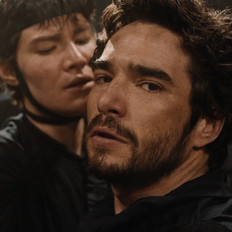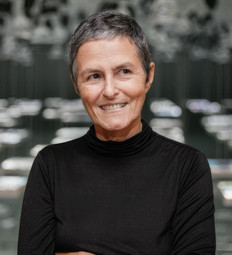
Audiovisual, Oficina, Conversa Aberta
The Hands at Work Project arrives at the CCVM this Tuesday
15 to 19 October 2024
Brand new adaptation of the Brazilian literary classic “Grande Sertano: Veredas”, by Guimarães Rosa, the movie “The Devil in the Street in the Middle of Redemunho”, directed by Bia Lessa, starring Caio Blat (Riobaldo) and Luiza Lemmertz (Diadorim), arrives in São Luís this Tuesday, October 15, starting with a tour-style release, with screenings in a new city each week. Distributed by Filmes do Estação, as part of the Hands to Work project, which is presented by the Instituto Cultural Vale through the Federal Culture Incentive Law, the film has already been screened in this model in São Paulo, Rio de Janeiro, Belo Horizonte and Porto Alegre.
The title of the feature film is one of the most famous phrases in the book, which narrates the trajectory of the gunman Riobaldo, facing his demons in wars for the Sertano Mineiro. The film was produced by 2+3 Productions, in co-production with Globo Filmes, Canal Brasil, RioFilme, 2+2 Comunicações and in association with Quanta, Effects Film and O Grivo. The release of the film will take place during the Hands to Work project, in the cities of Rio de Janeiro, São Paulo, Belo Horizonte, São Luís, Fortaleza and Porto Alegre, where meetings will be held with the director and the cast and various activities will be carried out around the universe created by the movie “The Devil in the Street in the Middle of Redemunho”.
The project consists of the presentation of the making of the play directed by Bia Lessa, the award-winning documentary “Where Ideas Are Born”, by Carolina Sá, and the screening of the film “The Devil on the Street in the Middle of Redemunho” in theaters, cinemas or educational spaces, in addition to lectures, debates and workshops on the subject. The lectures will cover different aspects of Guimarães Rosa’s work, such as its language, themes, in addition to exploring Bia Lessa’s creative process. The workshops, in turn, will provide learning and experimentation opportunities for participants. The debates, lectures, workshops, and screenings of the making of and the documentary will be free.
The film made its world premiere at the Rio Festival 2023 and then participated in several national and international festivals, such as the 2023 São Paulo International Film Festival, the 27th Tiradentes Film Festival, the 15th Frontier International Film Festival, the Festival du Cinéma Brésilien in Paris, the Berlin Film Festival and the Panorama Brasileiro do Cine at El Kirchner and screened at Yale University.
On the movie screen, the actors travel through a space without geographical references or borders. If in the theater the characters were imprisoned in a cage built by Paulo Mendes da Rocha and Camila Toledo, on the movie screen they wander in a greyish void, stunned by delirium, memory, fury and passion. They are characters from a hinterland where the ferocity of emotions is what is concrete in the face of the tragic nature of an intensely lived life. Lessa’s imaginary backcountry, like that of Guimarães Rosa, exposes the crossroads of tragedy in the representation of the world as a place of lacerating doubts. In this hazy hinterland, cinema itself, as a support for the apprehension of reality, is called into question by a metaphysics that challenges the limits of language.
Synopsis:
Riobaldo, a gunman (cangaceiro or gunslinger) relives his turbulent life in the hinterland. He recounts his experiences as a member of two opposing gangs, one led by Joca Ramiro and the other, by Zé Bebelo. He later assumes the leadership of the band after Ramiro’s death. The plot is marked by the presence of an enigmatic character named Diadorim, who becomes Riobaldo’s great love and raises countless questions in this regard: “Where is Demo? Is it outside or inside the man? How can a man love another man? People’s hearts – the dark, the dark…” Diadorim is a constant mystery for Riobaldo and Diadorim’s true identity is revealed only at the climax of the story.
The narrative is non-linear, with philosophical reflections intertwined with detailed scenes of life and bloody battles in the hinterland, including popular beliefs, legends, and traditions. At the core are issues of duality, ambiguity, and inner conflict. Riobaldo constantly grapples with moral choices and ethical dilemmas as he seeks to understand his place in the world and his own nature. The relationship between Riobaldo and Diadorim symbolizes many of these themes, exploring the complexity of identity, gender, and deep affections.
About Bia Lessa

Bia Lessa, a self-taught Brazilian multimedia artist, has worked in the areas of cinema, theater, music, opera, installations, exhibitions, museums and architecture. In cinema, he directed three feature films: “Believe me”, based on the work “The Chosen One”, by Thomas Mann, “Then I Died”, award for best feature film in the New Directions category at the Rio Festival, and the film “The Devil on the Street in the Middle of Redemunho”, based on the work of João Guimarães Rosa, with which he participated in the Rio 2023 Festival. He directed the miniseries “Letters to the World”, based on the work of Glauber Rocha, a documentary entitled “Scar”, about violence against women, for the Southbank Center in London, and “Doll’s House”, by Ibsen. His shows and films have been presented at the Center Georges Pompidou in Paris, the Madrid Autumn Festival, the Theater der Welt Festival in Germany, the Berlinale Film Festival in Berlin, the Sommer Theater Festival in Hamburg, the Sigma Festival in Bordeaux, the Zurcher Theater Spektakel in Zurich, the Caracas International Theater Festival, the Festival des Ameriques, in Montreal, the Dumaurier Festival, in Toronto, the Cadiz Film Festival and the San Francisco Film Festival, Biarritz, Shanghai, Jerusalem, Kolkata, Prague, Brisbane, Munich, Cologne, Dusseldorf, New York, etc. His first works in theater had no names, but numbers: “Essay Number 1”, “Essay Number 2” and so on, reinforcing the idea of a thought that developed from previous reasoning. His scenic trajectory was marked by experimental shows, carrying out a rigorous research project that privileged him to bring literary works to the stage. Throughout his career, he edited great literary works, such as “The Possessed”, by Dostoevsky, “The Man Without Qualities”, by Robert Musil, “Orlando”, by Virginia Woolf, “The Land of the Naked Boys”, by Graciliano Ramos, “The Brazilian Tragedy”, by Sergio Sant’Anna, “Journey to the Center of the Earth”, by Júlio Verne, “The Scene of Origin”, a transcription by Haroldo de Campos of excerpts from the Sacred (Ecclesiastes and Genesis). He recently edited “Macunaíma”, by Mario de Andrade, “Grande Sertano: Veredas”, by Guimarães Rosa, and “Pi – Insane Panoramica”, based on the works of contemporary authors.
He held important exhibitions, including “Grande Sertano: Veredas” at the Rio de Janeiro Museum of Modern Art, the exhibition “Clear and Explicit” and “Contemporary Itaú” at the Itaú Cultural Institute and the exhibition “Brazilian Baroque” at the Rediscovery Biennial. He performed “The Second Unveiling” at the UN Noble Hall, based on the panel “War and Peace”, by Candido Portinari. He made the exhibition-manifesto “Letters to the World”, a triptych divided into three chapters — “Asphyxiation”, “Merchandise” and “The Common” — based on the work of Glauber Rocha.
He created the “Brazil Pavilion” at Expo 2000 in Hanover, Germany and the “2012 Humanity Pavilion”, with Carla Juaçaba, during Rio+20, in Rio de Janeiro. He participated in the creation of the Paço do Frevo museums in Recife and the Museum Casa de Cultura de Paraty. The Portuguese Language Museum opened with the exhibition “Grande Sertano: Veredas”. He staged the operas — “Il Trovatori”, “Aida”, “Don Giovanni”, “Cavalleria Rusticana”, “Pagliacci” and “Suor Angelica” at the Municipal Theaters of Rio de Janeiro and São Paulo.
The HANDS TO WORK project
The Hands to Work project takes place in cities with artistic interventions, lectures, workshops, videos and films based on the work “Grande Sertano: Veredas”, by Guimarães Rosa, designed by Bia Lessa. The lectures and debates will address different aspects of the work, such as its language and themes, in addition to exploring Bia Lessa’s creative process. The workshops, in turn, will provide learning and experimentation opportunities for participants. The films screened that make up the Hands at Work Show will be “Where Ideas Are Born”, by Carolina Sá, produced by Samba Filmes, made possible by Curta! with funding from the Audiovisual Sector Fund (FSA), “Mutum”, by Sandra Kogut, Suzana Macedo’s works “Poem untangled from a footnote” and “Beings, Things, Places”, “The Third Bank of the River”, by Nelson Pereira dos Santos, and “Other Stories”, by Pedro Bial. Lectures, debates, workshops, and screenings of feature films, shorts, documentaries and making of will be free of charge. Mão à Obra is presented by the Vale Cultural Institute, through the Federal Culture Incentive Act.
October 15
16:00 – Hands at Work Show: “Beings, Things, Places”, Suzana Macedo (50 min) + “Poem Untangled from a Footnote”, Suzana Macedo (25 min)
19:00 – Screening of the movie “The Devil on the Street in the Middle of the Redemunho”. After the session, there will be a debate with the presence of Bia Lessa, Clara Lessa, Isis Rost, Jurandir Eduardo Pereira Junior, Luiza Lemmertz and Michelle Cabral
October 16
16:00 – Hands to Work Show: “Other Stories”, Pedro Bial (100 min)
October 17
From 10 a.m. to 6 p.m. – Creative Process Workshop, with Bia Lessa and cast
Registration form: https://forms.gle/LRnMPsWd5dfNy9fx6
19:00 – Hands to Work Show: “Where Ideas Are Born”, Carolina Sá (57 min) Bia Lessa Episode
October 18
From 10 a.m. to 2 p.m. – Creative Process Workshop, with Bia Lessa and cast
Registration form: https://forms.gle/LRnMPsWd5dfNy9fx6
16:00 – Hands at Work Show: “Mutum”, Sandra Kogut (95 min)
October 19
16:00 – Hands at Work Show: “Third Bank of the River”, Nelson Pereira dos Santos (98 min)
Daily
Projections
• Making of the show “Grande Sertano: Veredas”: preparation process for the editing of the show
• Nonada: Video about the exhibition about Guimarães Rosa, designed by Bia Lessa, set up at the Portuguese Language Museum in 2006
• Guimarães Rosa quotes: video projection with phrases from “Grande Sertano: Veredas”